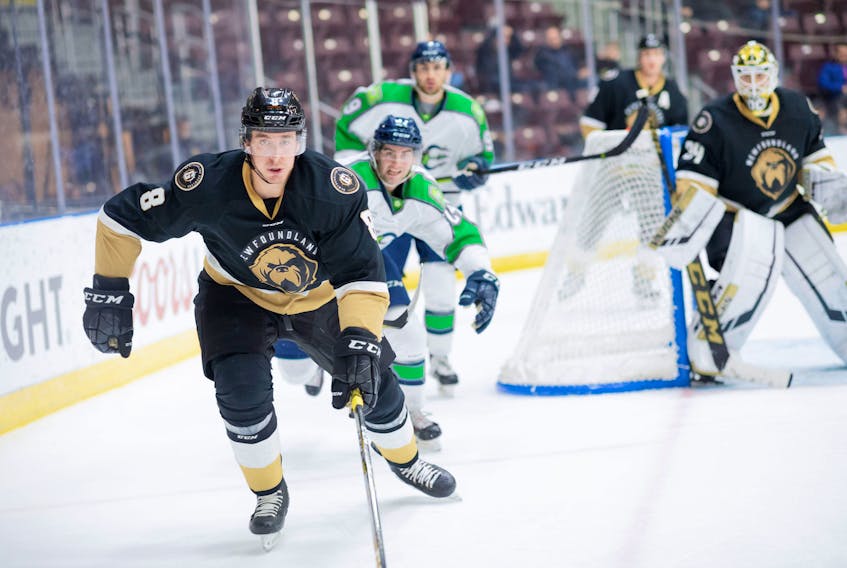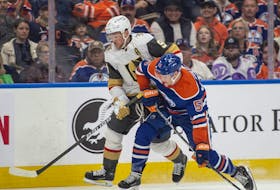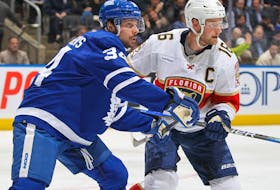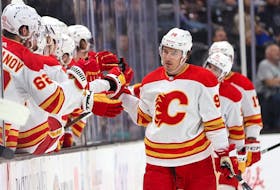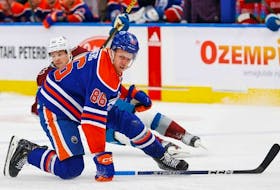In case you were wondering, that 18-round shootout in which the Newfoundland Growlers were involved Sunday afternoon in Portland, Me., in a game against the Maine Mariners, was not an ECHL record. Twice in league history, games haven’t been decided until the 21st round, the most recent being a 2013 contest between Fort Wayne and Florida.

But if you ask the Growlers, Sunday’s shootout shouldn’t have gotten so far as to have anyone considering if it was a record or not.
On the first attempt of the 11th round, after Newfoundland had gone through its full group of 10 forwards without a winner being decided, head coach John Snowden sent out defenceman.
Evan Neugold, who went with a deke-and-backhand move on Mariners’ netminder Colin Neil before tucking the puck into the net.
The referee ruled it a good tally, putting the Growlers up 5-4. But Neil immediately began arguing he had touched the puck with his stick before Neugold’s scoring shot. If so, the play should have blown dead before the goal.
The referee and the two linesmen, one of whom had been on the goal line on the side of the net opposite the ref, conferred and Neil’s grievance was eventually upheld.
So, the shootout continued and didn’t end until Maine’s Wade Murphy scored on the 36th attempt, giving the home side the win.
The Growlers haven’t kicked up any kind of public kerfuffle about what transpired Sunday. There was an inquiry to the league for clarification as to what transpired with regard to the decision, and word is Neugold is adamant he scored cleanly. But there was no official protest, even though there may have been reason for Growlers grumbling, beyond the result, which delivered their season-high fifth straight loss.
It appears this came down to the view of the linesman. It certainly didn’t come down to the in-house replay — courtesy of a camera placed in the upper levels of the arena —which didn’t show anything that could be described as being definite proof the original goal call should have been overturned.
Not that it should have made a difference even if the video scoreboard showed something to back up Neil’s contention he touched the puck. Those replays aren’t supposed to be used as a reference in such circumstances.

And here’s the crux of this piece: the ECHL doesn’t have yet official replays.
It needs them.
It has launched a pilot program in four league cities — Worcester, Toledo, Kalamazoo and Boise (Idaho) — using overhead cameras to help ensure correct goal calls. And here’s hoping it leads to full implementation next season, because otherwise, the league will continue to lag far beyond the NHL, AHL, major junior hockey and the NCAA.
Whenever it does come, it won’t be soon enough.
Mind you, this reporter is not a huge fan of the wide use of replays to either reinforce or overturn on-ice decisions. Those with relation to offside calls, in particular, can lead to lengthy dead spaces in a game that depends on pace and flow. And it can result in the confusion that comes with rolling back to clock to the time of a tardily determined offside infraction. These are instances when we should be more than satisfied with human judgement and sometimes, human error, an attitude that requires maintenance of the long-held belief “things will even out” over the course of a season.
But when it comes to calls on goals, which are the ultimate, clear-cut determinants of the outcome of games, the collection of evidence should be as widespread as possible.
Ideally, in-game decisions in hockey should start and end with referees or linesmen. As with the case Sunday, conferences of all the on-ice officials sometimes can be necessary. But calls on cases like Neugold’s goal/no-goal in Portland should be ultimately referred to what is seen on strategically placed cameras.
Here’s betting that even the technology that will be available to us a hundred years from now won’t lead to absolute correctness in on-ice rulings in hockey. But in 2019, a professional hockey circuit touting itself as an integral part of the development system for the National Hockey League should have replay methods that have proven effective in helping ensure the legitimacy of goals.
There is plenty of video evidence elsewhere to back up that argument. It’s just too bad there wasn’t any this past Sunday.
RELATED

